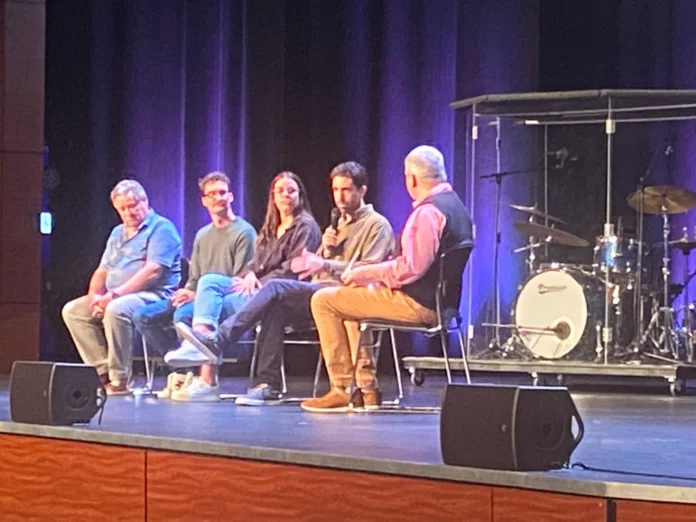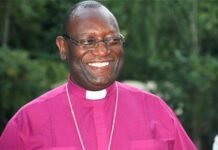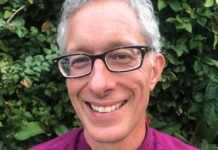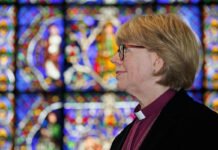Australian Christians are too often ignorant about their sisters and brothers across the Tasman. Bishop Jay Behan of the Church of Confessing Anglicans Aotearoa New Zealand and a team of New Zealanders gave a sharp update to the Gafcon Australasia conference.
“The reality is that in New Zealand now, there are two separate Anglican structures within the country,” Behan explained. “So, there’s the preexisting structure, which is called ACANZP, that stands for Anglican Church in Aotearoa New Zealand and Polynesia because the preexisting structure is not just in New Zealand, it’s in Aotearoa which is the Maori word for our country.” Behan then ribbed a couple of Aussie bishops for atrocious pronunciation of Aotearoa.
“But in 2018, the General Synod of ACNZP, of which I was a member, changed some of the canons of their church. And two in particular were the difficult ones. One was that they now, by canon within the church laws, permitted the blessing of same-sex marriages and relationships. The second one was they changed the teaching of the church, which allowed false teaching in areas of human sexuality. And the consequence of that was now that if people were in blessed same-sex marriages, they could be ordained.
“At that point, people had to work out how to respond… And there were some brothers and sisters in Christ who’ve remained in the kind of historic structure of ACNZP who still loved the Lord Jesus and trusted the Bible, and they’re serving gospel ministry within the structure.
“And then there were others who felt like we could no longer remain in good conscience, and we formed a new structure: CCANZ, which is the Church of Confessing Anglicans in New Zealand.”
Behan got the New Zealanders at Gafcon to talk about the danger of being seen by what you are against rather than what you are for in having these two structures.
Tim Capill, Assistant minister from Latimer Church in Christchurch, explained that the church of 600 meets as four congregations “in lots of different locations around the city due to a lack of buildings.”
“I think one of the things that we’re ahead of you on in New Zealand is secularism and paganism. And so the population of New Zealand, only 34% claim to be Christians. … There’s no guarantee that if you walk into any church in New Zealand, let alone an Anglican church, the Bible will be taught, and people will hear about Jesus. And so one of the things that we’re very keen to be doing as a larger church within the Church of Confessing Anglicans is to raise up gospel workers. So we run an internship program of two years, seeking to give people an opportunity to not only give ministry a go and discern whether or not they ought to be in full-time gospel work but also to help them catch a vision for training others to be doing gospel work. It is very similar to the MTS strategy that operates in this country.”
Sarah Scarrow, an intern at Latimer, took the mike. She described how, despite being as a trainee, she also trains others. “So rather than just getting equipped to do the ministry [I am] trying to teach other people how do the ministry and to make disciple-making disciples. At the moment, that’s doing one-to-one ministry with some newer Christians, teaching them how to read the word with other people and in the kid’s space, training up new leaders to faithfully teach the word to young kids we’ve got.”
Zane Elliott from Holy Trinity, Richmond, in the ACNZP evangelical Diocese of Nelson – in the north of the south island – pointed to the complex structure of the province (national church). ‘
“I think ACANZP’s structure is one of the most confusing in the Anglican world because we’re a three Tikanga church. And what that means is that we have three separate ethnic identities within our one church, and they’re all autonomous. And so that means that the gospel opportunities can be tricky to navigate sometimes, but we have some wonderful gospel opportunities among Maori people because we have a longstanding history. And Maori still regard the Anglican church with a very high sense of mana or respect.
“So there are two parts of those [ACANZP] entities that don’t bless same-sex relationships within our province. One is the Diocese of Nelson, where I am, and [the other] is Tikanga Pacifica at this stage.”
Elliott described a new partnership between CCA and the Nelson diocese. “We have been fortunate to receive at Bishopdale Theological College, a lecturer from CCA, the Reverend, not-yet-doctor, Dave Clancy. He’s doing his PhD studies at the moment, but he’s come from CCA to encourage our staff at Bishopdale College to lecture there. And we’ve received some students as well. So it’s been great to have CCA students coming to Nelson to be trained for ministry with our ministry training programme at Bishopdale Theological College.”
A crazy, brave story of being asked to care for someone coming out of prison with a brain injury – and what came next – came from Harold Forest, the vicar of a small church in Auckland, South Auckland Anglican Mission.
“We were asked to look after this person by the courts. We had no, we were only a little church of 20 to 25 people. We had no resources. We’re in the poorest suburb, basically, in the Auckland region. And so on the Sunday morning, after we were asked, we stood as a church – the whole church stood at the front – and we asked God for a house for this person.
“Within three days from people outside of the church, we were offered four houses. I then rang Jay, and I said, ‘What am I going to do, Jay? I’ve got no money. I’ve got four houses, one person.’ And Jay said to me, ‘Take what you can use, give the rest back to God, knowing he’s going to give you more.’
“He came out of prison. Now, we put him in a house, and within a week, we had two houses full of people with mental health and brain injury. In the two-and-a-half years we’ve been going, we now have 85 residents, 30 staff, and 20 properties.”
Behan asked, “Tell me how you not just care for them physically but seek to care for them spiritually.”
“Well, the first man … was baptised last year,” Forest responded. “He was a gang member, been a gang member for years. He’s got half his brain as a plastic skull, hit over the head in a gang fight. He got baptised. Malcolm here (Forest points) baptised them at our church.
“With frontal lobe injury, people get really angry and get wound up. As an organisation, we have a philosophy and policy that we practise what the Lord says, ‘turn the other cheek.’ Most other organisations will ring the police when they get angry and have them kicked out and put back in jail. We have the opposite, turn the other cheek. We walk away, give them space to have their anger and then come back and minister to them. And that has proven to work because we are showing … how God wants things done.
“We’re not accusing people. And we have seen people like Lewis now. His face has changed. He’s de-escalated. He comes to church every week. He actually reads the Bible in church now when he was basically illiterate, and he reads without stammer when he’s got partial paralysis.
“There’s another man up there on the screen at the moment. He walks around with a teddy bear and eats screws and stones, and is very illiterate. He went through a windscreen at 15, and Josh who’s here, was reading a Bible story to him one day when the interns visited us in Auckland. Josh asked him afterwards, do you want me to pray for you? And this man turned around and said, ‘As long as it is to Jesus.’ He is illiterate, and he can’t tell us the gospel. But he knew. And that was the first sign that we had, that this man had something [of a]relationship with God. And that’s what our work’s about.”



